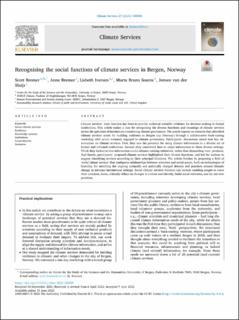Recognising the social functions of climate services in Bergen, Norway
Journal article, Peer reviewed
Published version

View/
Date
2022Metadata
Show full item recordCollections
Abstract
Climate services’ main function has been to provide technical scientific evidence for decision-making in formal institutions. This article makes a case for recognising the diverse functions and meanings of climate services across the spectrum of institutions constituting climate governance. The article reports on research that identified climate services needs for building resilience in Bergen city (Norway) through a collaborative back-casting workshop with actors variously engaged in climate governance. Participants’ discussions raised four key observations on climate services. First, they saw the potential for using climate information in a diverse set of formal and informal institutions. Second, they considered how to adapt information to these diverse settings. Third, they looked at how information could enhance existing initiatives, rather than demanding ‘new’ products. And fourth, participants’ proposed climate services highlighted their diverse functions, and led the authors to suggest classifying services according to their principal functions. The article finishes by proposing a field of ‘social climate services’ that configures relationships between scientists and social actors, built on technologies of humility, for enriching the ongoing culturally and politically charged debates and practices around climatic change in informal institutional settings. Social climate services function can include enabling people to voice their concerns, learn, critically reflect on changes to culture and identity, build social networks, and try out new practices.
